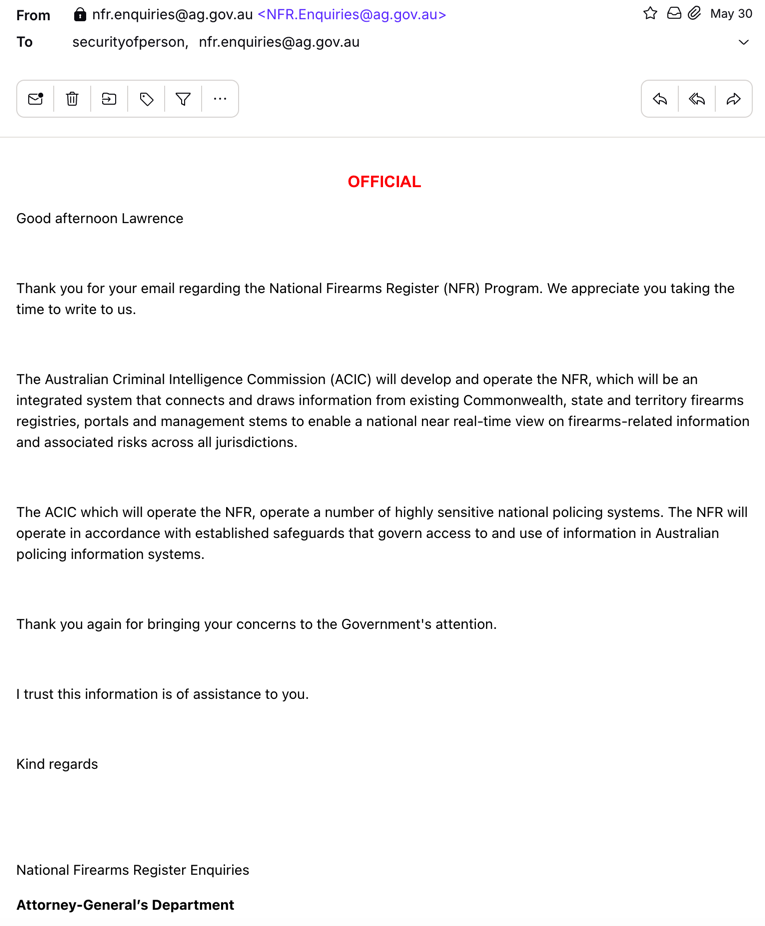Subject: Inquiry Regarding National Security Database Functionality
Dear Administration Team,
I hope this message finds you well.
I am reaching out to formally address two pressing questions about the proposed national security database, particularly focusing on its functionality and the critical aspect of data removability.
Given the current geopolitical climate characterized by escalating tensions and the looming possibility of invasion, the security of sensitive data—especially firearm registries—becomes increasingly concerning. Historical examples from the French and Polish resistance movements during World War II starkly illustrate the devastating impact of compromised information, where targeted intelligence led to brutal reprisals against resistance members and their families. During these crises, occupying forces skillfully utilized local police to gather intelligence, exposing individuals involved in resistance activities to severe consequences.
In light of these historical lessons, we would like to underscore a few key considerations:
- Local Collaboration and Associated Risks : The past strategies of occupying forces to collaborate with local law enforcement in identifying resistance fighters highlight the dangers of compromised data. In the face of increasing threats, it is crucial to recognize the potential for adversaries to employ similar tactics against individuals committed to resistance.
- Surveillance and Suppression : Historical occupations illustrate systematic surveillance and raids aimed at uncovering those who resist oppression. Modern adversaries now possess the means to recover deleted data, which heightens the risks for those included in firearm registries in the event of occupation.
- Civilian Reprisals : Accounts from history show that the identification of resistance members frequently resulted in harsh retaliations against innocent civilians. Thus, protecting personal information from enemy access is of utmost importance, especially as we brace for possible conflicts in the Pacific.
- Emergency Protocols and Data Deletion : While the Prime Minister has emergency powers during an invasion, the ability to delete firearm registries — and safeguard the identities of resistance organizers — requires consent from all state governments. This presents challenges in making prompt decisions, particularly if some leaders resort to appeasement.
To proactively address these concerns, we strongly recommend the establishment of a central database managed by the Australian Defence Force (ADF) that operates in total isolation from the internet. Such measures are essential to protect sensitive information from adversarial access and to prevent vital national security data from being exploited against those who support resistance efforts.
We advocate for the enactment of a law entitled “Safeguarding the Human Right to Security of Person,” which would emphasize our commitment to protecting individuals while also establishing a robust and cohesive Australian resistance against any threats of occupation.
With this context in mind, we respectfully pose the following questions:
- Will the proposed National Firearm Registry include a permanent deletion option in the event that an invasion occurs and parts of Australia are occupied by a hostile force?
- If deletion functionality is not available, what measures will be put in place to ensure the human right of “security of person” is upheld in the event that a hostile force gains access to the national firearm registry?
We look forward to your response and appreciate your attention to these critical issues.
Best regards,
Lawrence Lyons
Retired Police Officer, Queensland
Witness, 51 Royal Commission of Inquiry into Government and Police Corruption and Misconduct (Fitzgerald Inquiry)
Publisher “The Joke, 40 years of organized crime in Queensland”
For further information about the intent of the proposed Class Action please visit https://cpb.LIFE
The reply, that does not answer the two questions above:
- Will the proposed National Firearm Registry include a permanent deletion option in the event that an invasion occurs and parts of Australia are occupied by a hostile force?
- If deletion functionality is not available, what measures will be put in place to ensure the human right of “security of person” is upheld in the event that a hostile force gains access to the national firearm registry?
